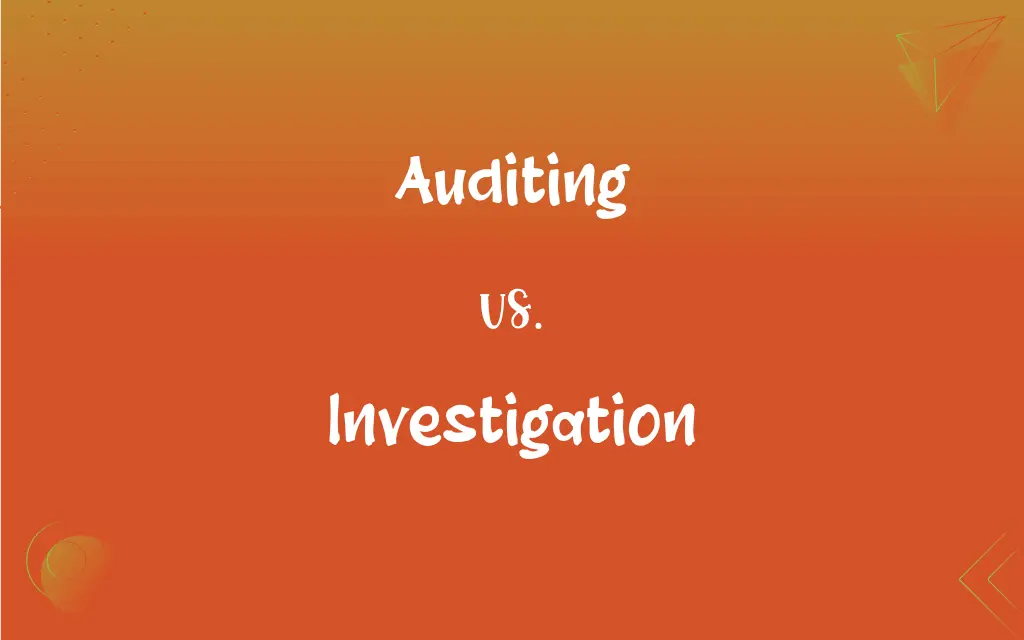Auditing vs. Investigation: What's the Difference?
Edited by Aimie Carlson || By Harlon Moss || Updated on October 20, 2023
Auditing evaluates financial statements for accuracy, while investigation is a detailed examination of a specific issue or concern.

Key Differences
Auditing and investigation both serve as methods of scrutinizing information, but they differ in purpose, scope, and depth. Auditing primarily refers to the systematic process of examining financial statements to ensure they are accurate, complete, and in accordance with established guidelines or standards. It is a regular procedure, often annual, to validate the correctness of accounts and ensure transparency in financial reporting.
In contrast, investigation delves into specific areas or issues when there's a suspicion of wrongdoing or to gain clarity on a particular matter. While auditing is a routine and broader examination, an investigation is usually more focused, analyzing particular transactions or events in depth. For example, if discrepancies arise during an audit, an investigation may be initiated to understand the cause and effect of such anomalies.
The intention behind auditing is to provide assurance to stakeholders, such as shareholders, that financial statements present a true and fair view of a company's financial position. This is usually carried out by external auditors who are independent of the organization. On the other hand, investigation aims to uncover facts, identify causes, or provide evidence. It can be instigated for various reasons, ranging from suspected fraud to due diligence for business acquisitions.
To put it simply, while both auditing and investigation involve careful examination, they differ in their objectives. Auditing seeks to affirm, providing confidence in the integrity of financial statements. Meanwhile, investigation seeks to uncover, diving deep into specific areas to retrieve detailed information or evidence.
Comparison Chart
Primary Purpose
Evaluate financial statements for accuracy
Examine specific issues or concerns in detail
ADVERTISEMENT
Scope
Broad, covering entire financial statements
Narrow, focused on a particular issue or event
Regularity
Routine, often annual
Occasional, based on specific concerns or suspicions
Intent
Provide assurance to stakeholders
Uncover facts, identify causes, or provide evidence
Conducted By
Usually external auditors
Can be internal or external parties based on the nature of issue
Auditing and Investigation Definitions
Auditing
A procedure to ensure financial records adhere to set standards.
Auditing helps maintain transparency in financial reporting.
ADVERTISEMENT
Investigation
A detailed examination to uncover specific information or evidence.
The investigation into the fraud allegations is ongoing.
Auditing
The assessment of accounts to verify their correctness and transparency.
External firms often handle the auditing to ensure unbiased reviews.
Investigation
Exploration or inquiry into matters of interest or concern.
The agency is conducting an investigation into the data breach.
Auditing
Validation of financial documentation to ensure adherence to regulations.
Auditing is essential for maintaining stakeholders' trust.
Investigation
The act of examining something closely, typically to solve a problem.
The product's malfunction led to an in-depth investigation by the team.
Auditing
Regular scrutiny of accounts to prevent discrepancies and errors.
Through rigorous auditing, the company detected minor accounting errors.
Investigation
A methodical search or research to ascertain facts.
The criminal investigation led to several significant findings.
Auditing
The systematic examination of financial statements for accuracy.
The company is undergoing its annual auditing process.
Investigation
Scrutiny to understand a particular event or discrepancy.
The sudden drop in sales prompted an internal investigation.
Investigation
The act or process of investigating
A politician under investigation.
FAQs
Do both auditing and investigation require expertise?
Yes, both processes require specialized skills and knowledge to be conducted effectively.
Is auditing always carried out by external parties?
While external auditing is common, internal audits are also performed by company's own personnel.
Can an investigation be initiated after an audit?
Yes, if discrepancies or concerns arise during auditing, it can lead to a deeper investigation.
What might prompt an investigation within a company?
Suspected fraud, employee misconduct, or regulatory concerns are common reasons for initiating investigations.
How does an audit ensure transparency?
By validating financial statements, auditing ensures that companies report information accurately and honestly.
Can a company refuse an external audit?
Public companies are often legally mandated to undergo external audits, while private entities might have more leeway.
Why are some audits unannounced?
Surprise audits can provide a more accurate picture by preventing data manipulation or preparation.
Is auditing mandatory for all businesses?
Many jurisdictions require public companies to undergo annual audits, but rules vary based on company size and type.
Can investigations be preventive?
Yes, some investigations, especially in due diligence scenarios, are proactive to prevent potential issues.
Are all investigations formal?
No, investigations can be formal or informal, depending on the nature and gravity of the issue.
Why is auditing essential for stakeholders?
Auditing provides assurance that financial statements are accurate, ensuring stakeholders can make informed decisions.
How do auditing and investigation differ in approach?
Auditing follows a set methodology, while investigations might be more flexible, adapting to the issue at hand.
What is the end result of an investigation?
Investigations aim to conclude with findings, evidence, or clarity on a specific issue or concern.
Are there different types of audits?
Yes, including internal, external, compliance, and forensic audits, each serving a unique purpose.
Is every investigation related to wrongdoing?
No, investigations can also be exploratory, aiming to understand a situation or verify information.
Do investigations always lead to legal actions?
Not always; investigations might simply conclude with internal actions or policy changes.
Is technology changing the landscape of auditing and investigation?
Yes, with advancements like AI and data analytics, both processes are becoming more sophisticated and efficient.
How long does an audit typically take?
Audit duration varies based on company size and complexity, ranging from days to months.
Who typically conducts business investigations?
It can be internal teams, external experts, or regulatory bodies, depending on the issue.
Are investigations always confidential?
Typically, investigations are confidential to protect involved parties, but disclosure might be necessary based on findings.
About Author
Written by
Harlon MossHarlon is a seasoned quality moderator and accomplished content writer for Difference Wiki. An alumnus of the prestigious University of California, he earned his degree in Computer Science. Leveraging his academic background, Harlon brings a meticulous and informed perspective to his work, ensuring content accuracy and excellence.
Edited by
Aimie CarlsonAimie Carlson, holding a master's degree in English literature, is a fervent English language enthusiast. She lends her writing talents to Difference Wiki, a prominent website that specializes in comparisons, offering readers insightful analyses that both captivate and inform.































































